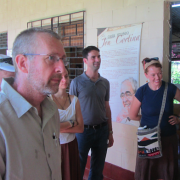Jesuit Higher Education: Collaborations in Latin America
 Over 200 leaders from Jesuit colleges and universities across the global are gathering in Melbourne, Australia, this week for a conference entitled, “Expanding the Jesuit Higher Education Network: Collaborations for Social Justice.” ISN has invited a number of attendees to offer reflections on the sessions and discussions taking place during the gathering. The collection of reflections can be found here.
Over 200 leaders from Jesuit colleges and universities across the global are gathering in Melbourne, Australia, this week for a conference entitled, “Expanding the Jesuit Higher Education Network: Collaborations for Social Justice.” ISN has invited a number of attendees to offer reflections on the sessions and discussions taking place during the gathering. The collection of reflections can be found here.
The following are reflections from a session entitled “Collaborations in Latin America” representing the work of the Association of Latin American Jesuit Universities (AUSJAL). The session was presented Dr. Fernando Fernandez Font, S.J., of Iberioamerican University in Puebla, Mexico.
In the world of winners and those excluded, the latter look for opportunity elsewhere, they don’t disappear. The dynamic is historical where powerful countries invaded the poorer countries and now the poor seek the riches.
A few realities include:
- There are now 231 million migrants and 49% are now women
- A further 15.4 million are refugees
- with 27.5 million internally displaced people
- As a result 440 million dollars are sent back as remittances with this new colonialism
Dr. Fernandez explains the work with migrants in Mexico and the flows from Latin America to USA. “Paperless people have no references or permits.” The death train from South America illustrates the disastrous process of migration. This was also visualized by photos of the circumstance of el rio Bravo where many are not able to cross, get stuck in the middle of no where or captured by gangs.
“What are the causes,” he asks:
- Displacement is caused by violence and gangs, Honduras and El Salvador
- Human rights are systematically abused in Guatemala, Honduras, El Salvador and Mexico.
- There is discrimination and xenophobia against Haitians.
- Militarization in Guatemala, Mexico and USA and
- Cyclones in Haiti cause migration
There 48 programs supported by the universities and the Jesuit Provincial Conference of Latin America (CPAL). The challenge is in more research an accompaniment.
Pedro Walpole, S.J., is the Director of Research at the Institute of Environmental Science for Social Change in the Philippines and the Coordinator of Reconciliation with Creation for the Jesuit Conference Asia Pacific. He holds a doctorate in land use change from King’s College in London. He is a practitioner in sustainable environment and community land -management in Southeast Asia.
His interests include seeking social justice through environmental management, poverty reduction in forest lands, partnerships for local development, and advancing social concerns in forest law enforcement and governance, climate justice, and indigenous peoples’ rights.











Good education creates noble minds and kind hearts.